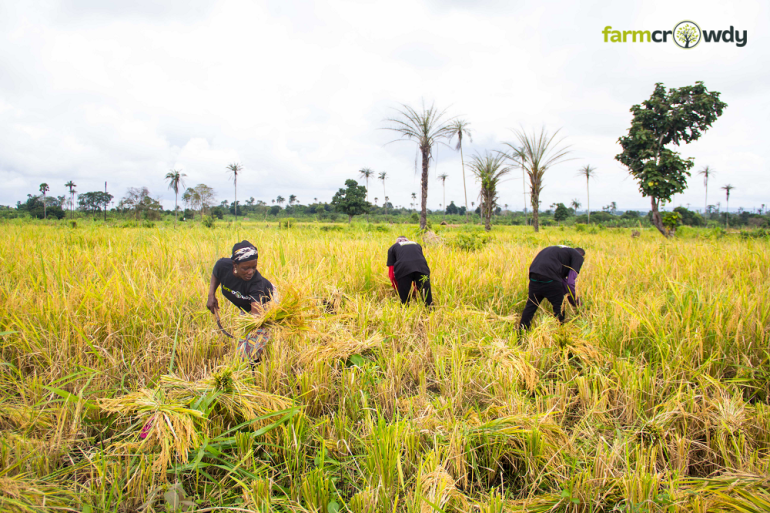In 2018, the minister of Agriculture and Rural Development, Chief Audu Ogbe mentioned that about 30% – 40% of the foods produced in Nigeria is ultimately wasted. This means that the problems stem beyond the farming process as issues such as wastage can still hinder successful Agriculture.
In the United States of America, only about 2% (2.1 million) of the country’s population are farmers yet American farms contribute about 136 billion dollars to the nation’s GDP. Agriculture in Nigeria has the potential to generate more if we can tackle the problems head-on instead of looking short fixes. Here are some of the problems we’ve identified and proposed solution:
-
Lack of Modernization/Mechanization:

At this day and age, farmers in Nigeria still rely on crude tools for farming and storage and this can inadvertently affect productivity. For instance, lack of proper irrigation tools makes it difficult to farm during the dry season and lack of mechanical tools such as tractors to substitute manual labor hinders productivity due to fatigue.
Solution: since most farmers in Nigeria are rural farmers, the Government as a huge role to play in regards to favorable policies, agricultural research, grants to rural farmers, subsidized farm equipment and storage facilities. The Ministry of Agriculture should provide farmers with modern tools such as tractors, plows, and irrigation tools. Cooling supplies for perishable goods can also be installed in trucks to keep perishable food products fresh. Incubators should also be acquired to enhance poultry farming.
2. Lack of Information:
Lack of information is one of the major problems that exist in Nigeria’s agriculture sector.
To begin with, there is more to farming than just digging the soil and planting crops. Farmers need to know how to select the right seed variety to get optimum yield, the best time for planting, best on-farm practices to reduce crop loss and how to partner with the right off-takers to get the best price for their product.
Solution: Farmers should be open to learning new techniques to improve their crop yield. They should also actively seek and share knowledge with their farming communities. Adequate training and seminars should be held for farmers and new technologies should be introduced. If possible, farmers should be monitored to ensure new knowledge gained is applied on their farms.
3. Poor Infrastructure:
The absence of fundamental facilities and inadequate systems have been a major stumbling block in the agriculture business in Nigeria.

Poor infrastructure discourages potential local and foreign investment and leads to wastage of the farm products that are cultivated under this.
Solution: Basic amenities such as good roads, water, and electricity should be provided to farming areas. This will increase productivity and Agric output. This output can, in turn, be used to invest in other farms.
4. Poor Research and Record Keeping:
Farm records are kept carelessly if kept at all. Farmers do not have accurate tracking of farm activities and farm information. Information about the Nigerian farm market is not easily accessible and adequate information such as market prices are pertinent. This opens the door to adulteration of figures regarding farming in Nigeria. Agricultural development in Nigeria cannot be measured if there is disorganization of the farm records for research purposes. This makes it hard to narrow down certain farming issues and proffer solutions.
Solution: Proper documentation and record keeping of farming information should be adapted.
5. Finance:
88% of Nigerian farmers are considered small family farmers. Some of this stems from the lack of funds to expand to large scale farming. Despite their importance for the domestic economy and due to the sector’s productivity limitations, more than 72 percent of Nigeria’s smallholders live below the poverty line of USD 1.9 (691) a day.
One of the major factors limiting farmers from growing and making a reasonable living is lack of funds. These funds are difficult to come by as some banks do not loan to them for various reasons. This leads to the farmers struggling to make a living, asking disinterested family members to take part in farming instead of hiring proper human labor, and affecting agricultural productivity overall.
Lack of capital also prevents potential farmers from venturing into farming business.
Solution: The advent of online farming and crowdfunding has made it easier for farmers to obtain funds for farming. Platforms such as farmcrowdy now exist where a sponsor can invest in a farm for interest after a stipulated period and the investment will serve as funding for the farmer. Both the farmers and the sponsors get their share from the profits, and everyone comes out happy.

If you would like to be a part of the people putting an end to the finance problem in Agriculture one farm at a time, you can click here to sponsor a farm.






